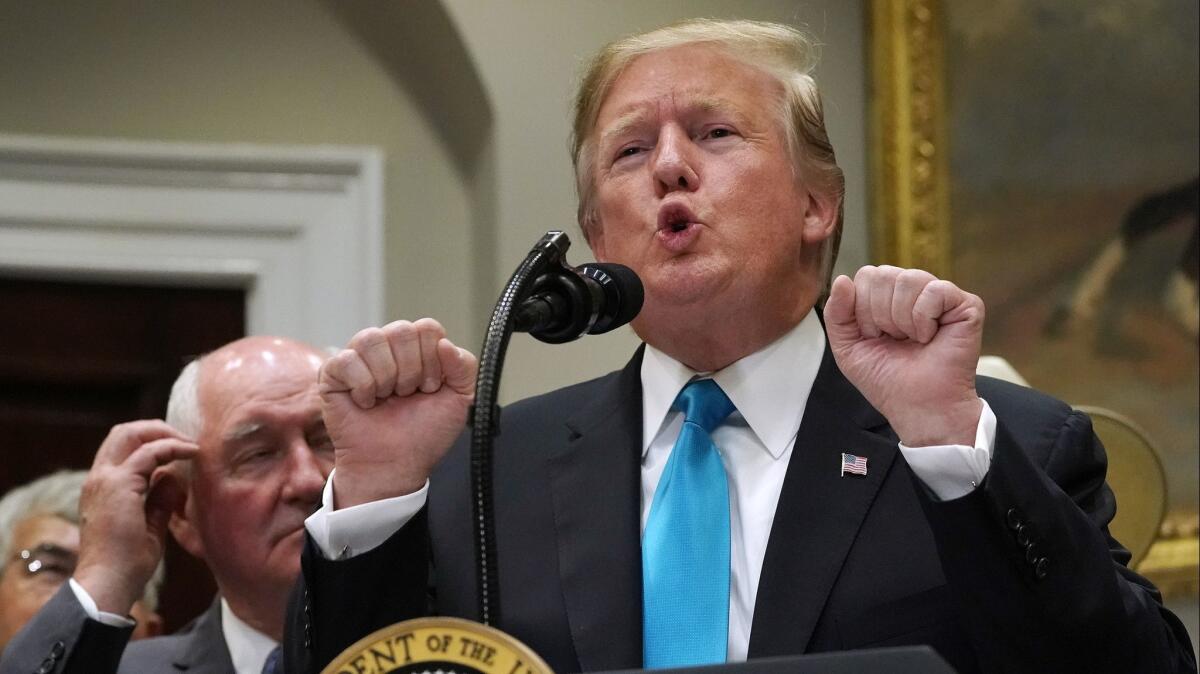Op-Ed: Whatever Trump gave you in tax cuts he’s taking away with his trade war

President Trump’s 2017 tax legislation cut the tax bills of most middle-class wage earners in 2018 — a fact that the president and his allies in Congress have been trumpeting ever since. Nonpartisan estimates show that the bottom 80% of taxpayers by income received, on average, about $795. But that money wasn’t in anyone’s wallet for long. Their pockets were being picked by other Trump policies.
One big swindle is a result of the president’s trade war. A new analysis published May 23 showed that tariffs on goods from China essentially negated any savings from the 2017 tax cuts — and that was without even accounting for the 5% tariffs he’s threatened to slap on goods from Mexico starting Monday.
Tariffs lead to higher prices, so they wind up being paid by consumers like a hidden tax. Study after study published by economists this year has confirmed that the new tariff payments coming into the U.S. Treasury are ultimately coming from the pocketbooks of Americans, not anyone in China. Even if U.S. consumers buy domestic products, they still wind up paying more; higher prices on imported goods allow U.S. manufacturers to raise their own prices.
Americans will pay for the trade war twice: once as consumers, and again as taxpayers funding farmer bailouts.
With the recent tariff increase from 10% to 25% on China, the typical U.S. household will pay out $831 in higher prices. So there go all the benefits of the 2017 tax cuts for millions of middle-class Americans. For low-income Americans the costs will be even more out of whack because their tax cuts were smaller than average, and tariffs are a regressive consumption tax; poor households pay a larger share of their income in tariffs than do rich ones. Trump is now threatening to impose tariffs on Mexico too, which will only add to the pain.
What’s more, with $28 billion already authorized as payments to farmers hurt by China’s retaliatory tariffs, most Americans will pay for the trade war twice: once as consumers, and again as taxpayers funding farmer bailouts.
Trump’s trade wars are value-destroying propositions in other ways, too. Workers in export industries are directly hurt by the retaliatory tariffs. U.S. manufacturers, giant corporations and small businesses alike, pay more for imported components and so are less competitive in global markets. None of this helps the American workers who have long felt left out of economic progress. Instead, moving away from an open economy disrupts labor markets, increases the risk of layoffs, and exacerbates income inequality.
Trump and the GOP-controlled Congress also said the 2017 tax bill would lead to higher wages. It has, unsurprisingly, failed to deliver on that front: Nonsupervisory wages are up only 1.2% adjusted for inflation according to a new study by the nonpartisan Congressional Research Service. That report also shows GDP growth for 2018 was 2.9% — almost exactly what was forecast before the tax law passed. The tax cuts didn’t trigger anything close to the economic growth claimed by the administration.
Enter the Fray: First takes on the news of the minute from L.A. Times Opinion »
Here’s where the tax law did deliver what it promised: It weakened the mandate to carry health insurance that was the crux of the Affordable Care Act. The knock-on consequences of that will be higher monthly premiums for most. For families in the bottom 60% of the income distribution, this increase in health insurance premiums is estimated to be many times the size of the tax cut. In Kansas, for instance, a middle-class household of four in that income bracket got $510 in tax relief; on the private insurance market that family will pay an additional $2,070 a year.
The tax cuts also added about $2 trillion to our national debt, which inevitably will lead to future taxes (or spending cuts). And for all that, the tax breaks will evaporate in 2026 when they expire. All that will remain will be the cost of paying for the gigantic transfer of wealth from poor to rich that the 2017 tax law engineered.
When a magician engages in this sort of sleight of hand on stage, we are delighted by the illusion. When the president of the United States does it to hardworking citizens with bad trade and tax policies, the right response is outrage.
Kimberly A. Clausing (@KClausing) is a professor of economics at Reed College and the author of “Open: The Progressive Case for Free Trade, Immigration, and Global Capital.” Edward Kleinbard is a professor of law at USC’s Gould School of Law and the author of “We Are Better Than This: How Government Should Spend Our Money.”
Follow the Opinion section on Twitter @latimesopinionand Facebook
More to Read
A cure for the common opinion
Get thought-provoking perspectives with our weekly newsletter.
You may occasionally receive promotional content from the Los Angeles Times.










